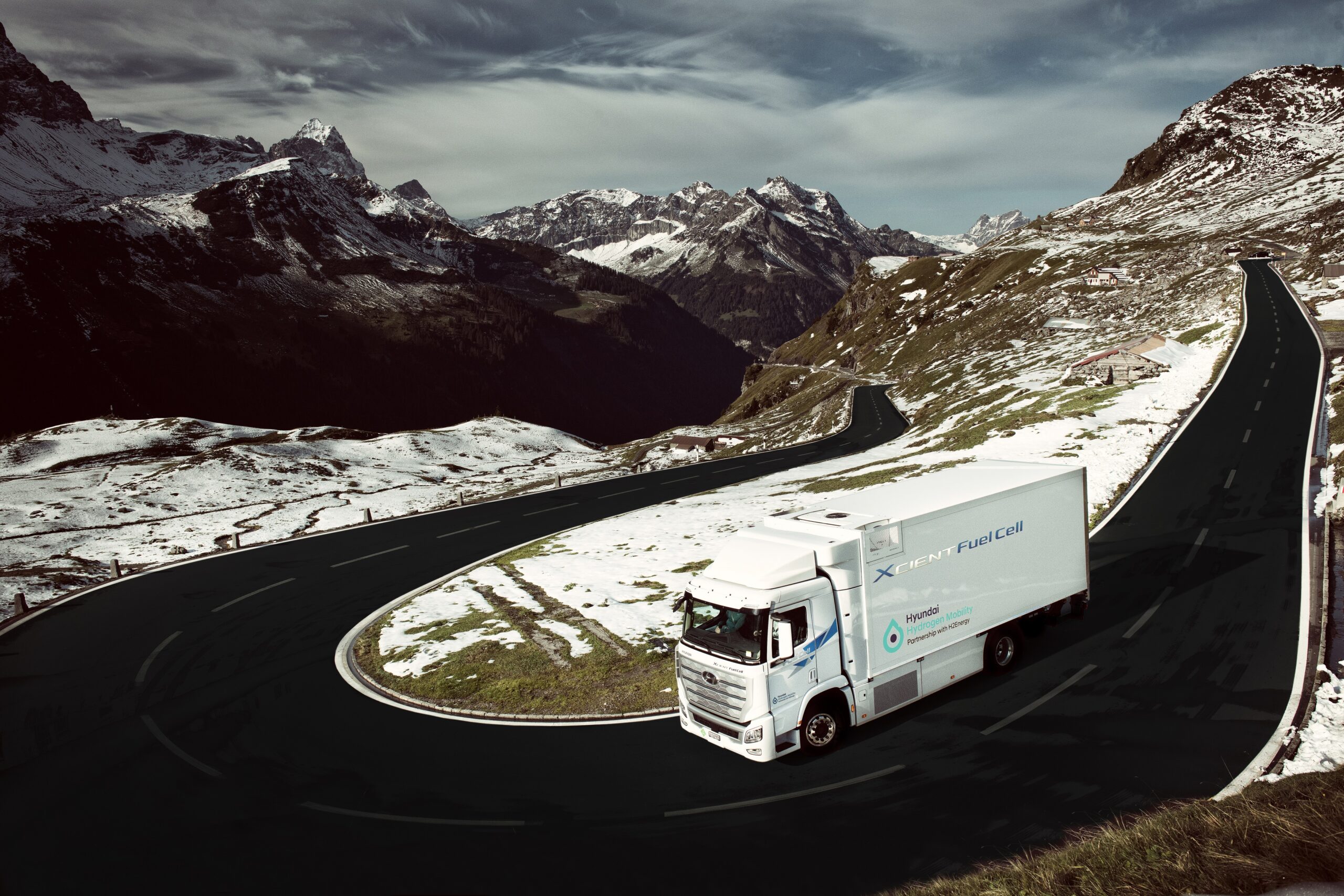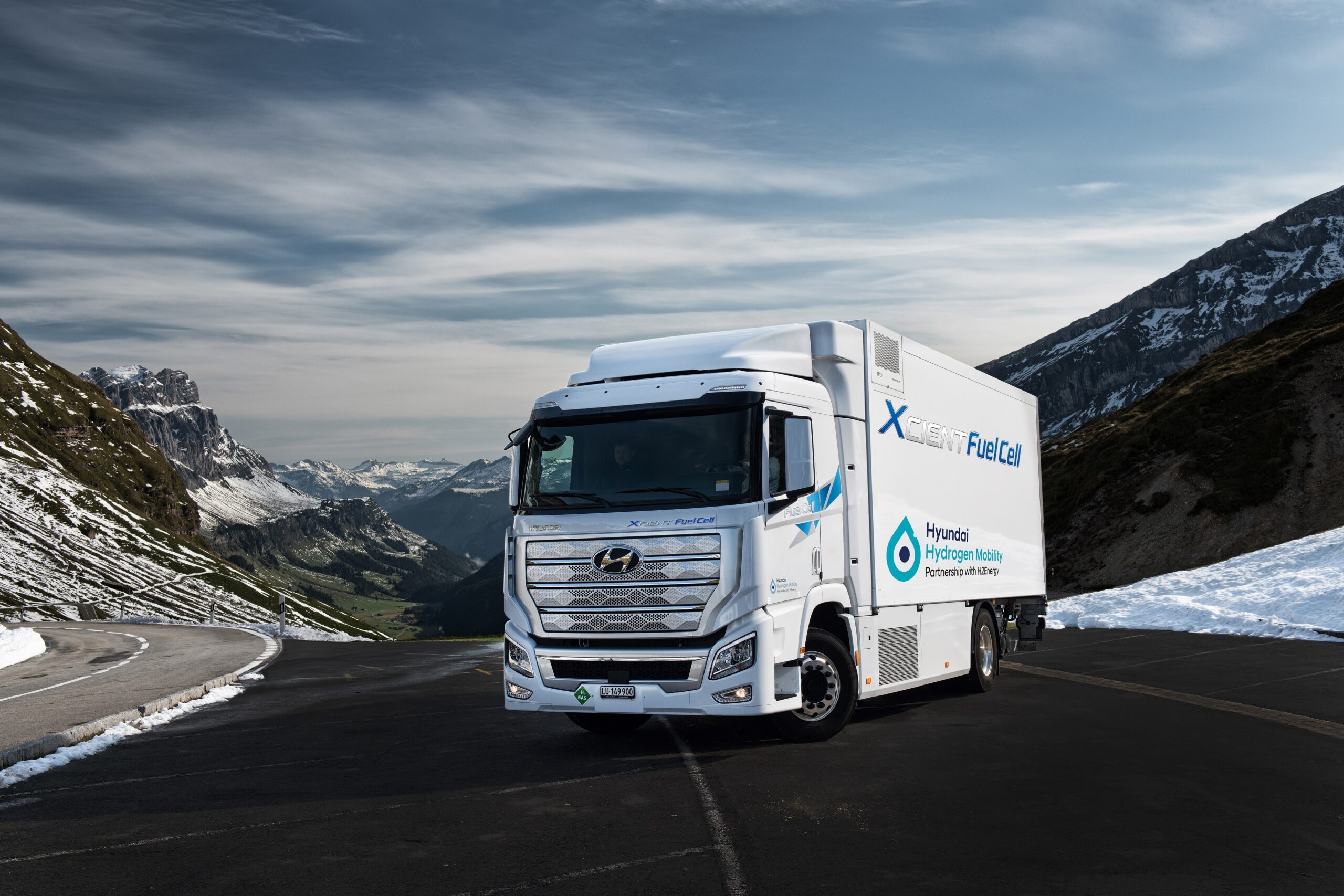Hyundai Motor’s Delivery of XCIENT Fuel Cell Trucks in Europe Heralds Its Commercial Truck Expansion to Global Markets
- With a successful launch in Europe, Hyundai announces plans to offer XCIENT Fuel Cell heavy-duty commercial trucks in North America and China
- Production capacity of XCIENT Fuel Cell to reach 2,000 units per year by 2021 to support expansion in Europe, the U.S. and China as demand for clean transport solutions grows
- First seven units of the world’s first mass-produced heavy-duty fuel cell truck delivered to customers in Switzerland start hauling today, emitting only water vapor
SEOUL/ / LUZERN, October 7, 2020 — Hyundai Motor Company today delivered the first seven units of its XCIENT Fuel Cell, the world’s first mass-produced fuel cell electric heavy-duty truck, to customers in Switzerland, with a total of 50 hitting the roads there this year. The delivery of XCIENT Fuel Cell marks the official entry of Hyundai’s commercial vehicles in the European market, a touchstone for the company’s expansion into the North American and Chinese commercial markets.
“The delivery of XCIENT Fuel Cell starts a new chapter not only for Hyundai’s hydrogen push, but also the global community’s use of hydrogen as a clean energy source,” said In Cheol Lee, Executive Vice President and Head of Commercial Vehicle Division at Hyundai Motor. “Today’s delivery is just a beginning as it opens endless possibilities for clean mobility. With successful delivery of the first XCIENT Fuel Cell trucks, we proudly announce our plan to expand beyond Europe to North America and China where we are already making great progress.”

Production capacity of the XCIENT Fuel Cell will reach 2,000 units per year by 2021 to support its expansion into Europe, the U.S. and China as demand for clean mobility grows. The increase in capacity will be backed by a USD 1.3 billion investment in addition to a previously announced USD 6.4 billion stake in establishing a hydrogen ecosystem to support creation of a hydrogen society.
In the U.S., Hyundai is collaborating with logistics leaders to supply mass-produced fuel cell heavy-duty trucks. Hyundai revealed the fuel cell-powered HDC-6 NEPTUNE Concept Class 8 heavy-duty truck at the North American Commercial Vehicle (NACV) Show in October 2019, hinting at what the future holds and Hyundai’s plans for it. To back this plan, Hyundai is partnering with companies to build a complete hydrogen value chain covering everything from hydrogen production and charging stations to service and maintenance. The North American market will also get a 6×4 tractor model. By 2030, Hyundai expects more than 12,000 fuel cell trucks to hit the U.S. roads.
Hyundai also is working with various parties in China, which aims to get 1 million hydrogen vehicles on its roads by 2030 as the country’s hydrogen industry is on a sharp growth trend, creating massive potential. Initially, Hyundai will focus on China’s four major hydrogen hubs: Jin-jin-ji, Yangtze River Delta, Guangdong Province and Sichuan Province. It is currently discussing cooperative initiatives such as a joint venture with local partners.
Three fuel cell electric trucks are scheduled for launch in China: a medium-duty truck in 2022, a heavy-duty truck in in a couple of years, and another heavy-duty truck strategically designed for the China market. With these models, Hyundai’s goal is to achieve aggregate sales volume of 27,000 units by 2030.
A key to Hyundai’s global expansion of fuel cell trucks will be the successful launch of XCIENT Fuel Cell in Europe. The seven customers who received the first batch of XCIENT Fuel Cell trucks will haul payloads of consumer goods around Switzerland, emitting nothing but clean water vapor. The operations will be backed by a robust green hydrogen ecosystem.

In 2019, Hyundai Motor Company formed Hyundai Hydrogen Mobility (HHM), a joint venture with Swiss company H2 Energy. HHM also is partnering with Hydrospider, a joint venture of H2 Energy, Alpiq and Linde. The customers will be leasing XCIENT Fuel Cell trucks from HHM on a pay-per-use basis that does not require an initial investment. Hyundai will take the success in Switzerland to broader European markets as Hyundai establishes solutions and partner networks in.Austria, Germany, the Netherlands and Norway.
As part of its production expansion plan, Hyundai expects to supply 1,600 commercial fuel cell trucks by 2025. Currently, Coop, Migros, Traveco, Galliker Logistics, Camion Transport, F. Murpf AG and G. Leclerc Transport AG along with others have placed orders for XCIENT Fuel Cell. They will be utilizing the trucks to haul everything from food to cars around Europe.
To support the growing hydrogen ecosystem, Hyundai has a business case for more than 100 hydrogen fueling stations in Switzerland, which is enough not only for commercial vehicles, but also passenger fuel cell electric vehicles. Likewise, Hyundai plans to act as a sector coupler in bringing various players to the hydrogen value chain as part of its efforts to bring value.
Hyundai will introduce a full model change for XCIENT Fuel Cell that will sit on a dedicated hydrogen fuel cell truck platform in the next few years. The new model will feature an e-axle and two 200-kW fuel cell systems that are under development. The new model lineup will include 4×2 and 6×2 cargo trucks and 4×2 tractors that can cover a significant portion of Europe’s major heavy duty truck market. The 44-ton GCW tractor will have a range of up to 1,000 kilometers on a single charge. These models will help the effort to replace pollutant-emitting diesel-powered trucks.
Hyundai has been devoting itself to further develop fuel cell technology and establish the supply chain to realize a ‘Hydrogen Economy’ for a better and cleaner future, an effort receiving worldwide acclaim. Hyundai Motor’s Hydrogen Mobility Solution won the Truck Innovation Award at the International Truck of the Year (IToY) last year, and XCIENT FC won the Innovation Award in hydrogen energy and fuel cell technology at the 5th Shanghai Forum held on September this year.
Main Specifications
| Item Model | XCIENT Fuel Cell | |
| Vehicle Type | Cargo (Chassis Cab) | |
| Cab Type | Day Cab | |
| Drive System | LHD / 4X2 | |
| Dimensions [mm] | ||
| Wheelbase | 5,130 | |
| Overall (Chassis Cab) | ||
| Length | 9,745 | |
| Width | 2,515
(2,550 with side protector), max. allowable width 2,600 |
|
| Height | 3,730 | |
| Weight [kg] | ||
| Max. Gross Combination Weight | 36,000 as pull-cargo | |
| Max. Gross Vehicle Weight | 19,000 as rigid truck | |
| Front / Rear | 8,000 / 11,500 | |
| Empty Vehicle Weight (Chassis Cab) | 9,795 | |
| Calculated Performance | ||
| Drive Range | Accurate range to be confirmed later | |
| Max. Speed | 85km/h | |
| Powertrain | ||
| Fuel Cell Stack | 190 kW (95 kW x 2 EA) | |
| Battery | 661 V / 73.2 kWh – by Akasol | |
| Motor / Inverter | 350 kW / 3,400 Nm – by Siemens | |
| Transmission | ATM 4500R – by Allison, 6 fwd. speeds, 1 reverse speed | |
| Rear Axle ratio | 4.875 | |
| Hydrogen Tank | ||
| Filling Pressure | 350 bar | |
| Capacity | 32.09 kg H2 (available hydrogen amount at SOF 100%) | |
| Brake | ||
| Service Brake | Disc | |
| Auxiliary Brake | Retarder (4-Speed) | |
| Suspension | ||
| Type | Front / Rear | Air (2-bag) / Air (4-bag) |
| Tires | Front / Rear | 315/70R22.5 / 315/70R22.5 |
| Safety | ||
| Front Collision-avoidance Assist (FCA) | Standard | |
| Smart Cruise Control (SCC) | Standard | |
| Electronic Braking System (EBS) +
Vehicle Dynamic Control (VDC) |
Standard (ABS is included in VDC) | |
| Lane Departure Warning (LDW) | Standard | |
| Air Bag | Option | |
| * Hyundai Motor Company reserves the right to change specifications and equipment without prior notice. | ||





